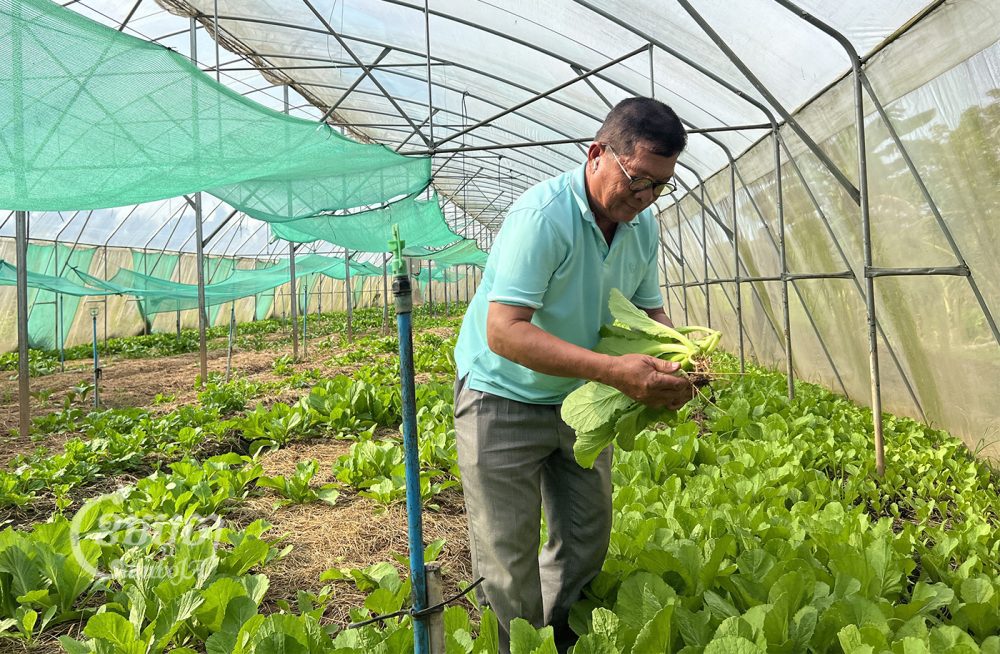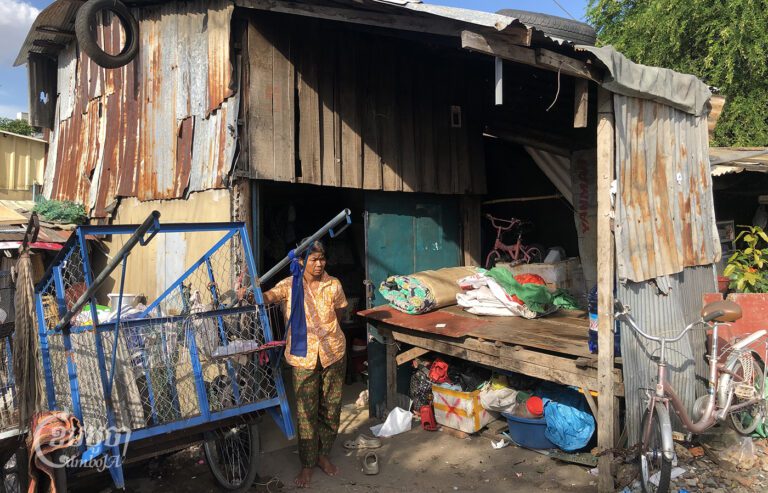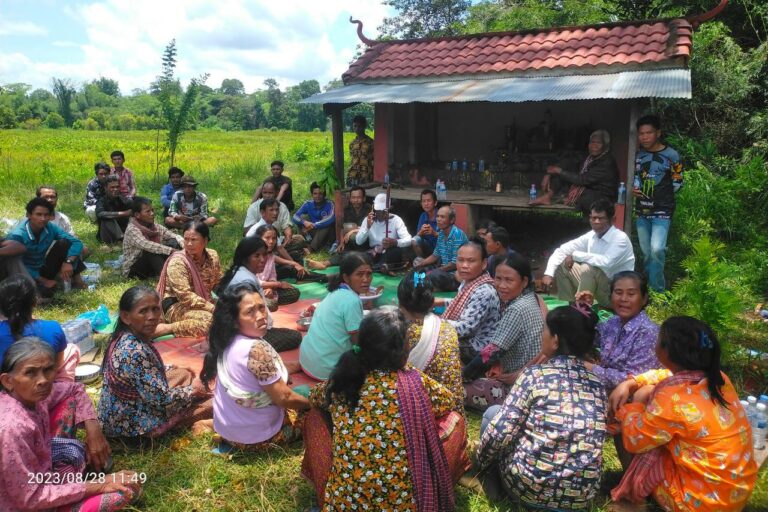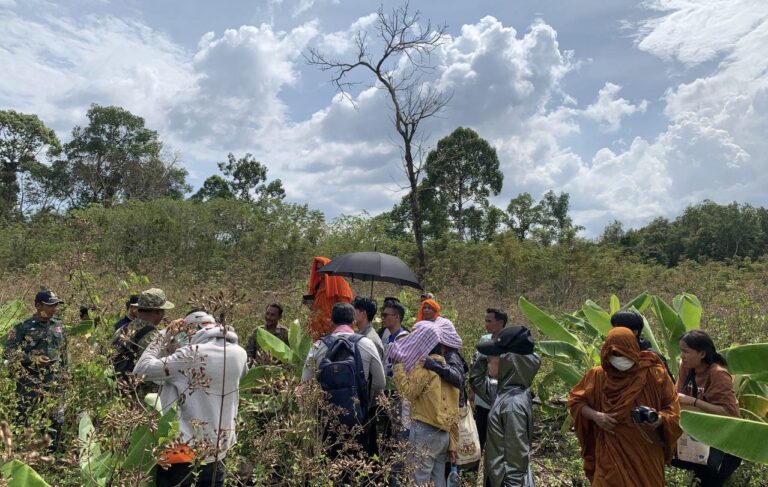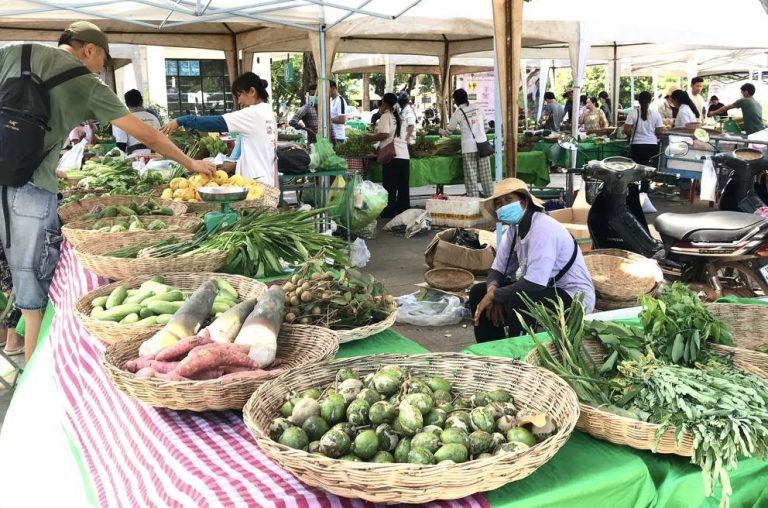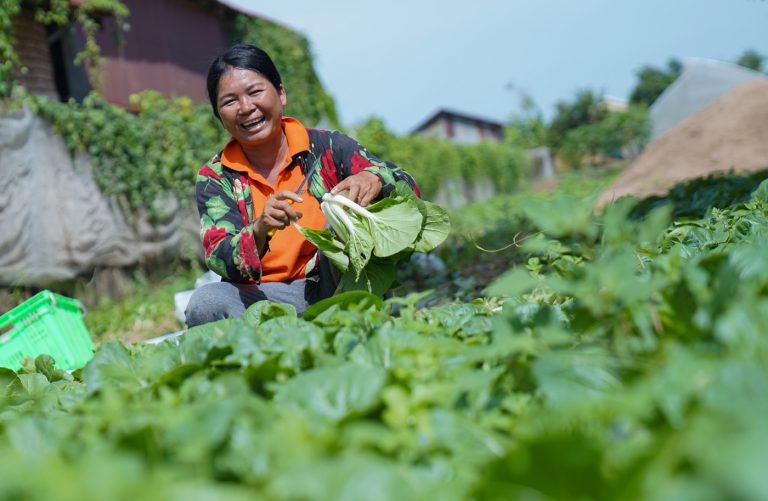Cambodian farmers participating in three different certification initiatives have transitioned to organic vegetable farming, which sustains their income, improves their nutrition, and helps promote organic produce in the domestic market at the same time.
Sorn Tieng, 36, is a farmer and internal inspection officer for European Union certification standards in Khsach Sar village, Krang Lvea commune, Samaki Meanchey district of Kampong Chhnang province.
Without development agencies like the German International Cooperation in Cambodia and Control Union Cambodia that help farmers implement certified farming standards, and private companies like Natural Agriculture Village company that buy farmers’ produce, some of the villagers would have had to migrate from where they live, Tieng said.
“They absolutely have to migrate because they are unemployed. Therefore, they need to migrate to earn extra income to support their family members,” he added.
He added that the members of the project planting organic vegetables according to EU certification come from four villages of three communes in the Samaki Mean Chey district, totalling 165 families. The families selected for the project are the poorest farmers who have no land or limited land.

Tieng said that before local farmers applied EU standards by growing a variety of crops, they faced a lot of difficulties related to the lack of markets they could sell to.
He said that during the pandemic, the organizations, especially the Natural Agriculture Village, helped to find markets and purchased vegetables from the farmers, helping to maintain their livelihoods at the time.
“When we started in 2019, we were still growing on a small scale, growing only peanuts, peas, and sesame,” Tieng said. “We started growing other vegetables in 2020, such as choy sum, pak choy, lettuce, yard-long bean, white carrot, and so on.”
One thing they found beneficial was that they no longer had to spend money to buy chemical fertilizers; they could use the manure in their villages. This was also better for their health. “When they spray chemicals on vegetables, it destroys their health and those around them,” Tieng said.
“They [local farmers] can earn an average of 500,000 riels per month from growing vegetables on their land, after expenses,” he said.
Rebekah Bell, the representative of the Food and Agriculture Organization of the United Nations in Cambodia, said at a training workshop for journalists on June 15 that the production and consumption of safe food have immediate and long-term benefits for the people, the planet, and the economy.
“Food safety is everybody’s business,” she said. “If food is not safe, it is not food.”

Phat Sokha, 43, a farmer in Toul Krouch village, Krang Yov commune, Sa’ang district of Kandal province, has been planting organic vegetables – according to the Participatory Guarantee Systems (PGS) – since 2017. He said he joined training sessions organized by Kandal provincial agriculture department and Natural Agriculture Village, focusing on organic vegetable growing, composting, and fertilizing techniques.
“Growing this type of vegetable is a bit tiring, compared to those that grow outside of the net house,” he said. “For the yield, the yield is sometimes similar, but the profit is more than when we do not use pesticides and agricultural fertilizer. We only spend a small amount of manpower.”
His average income from selling vegetables per month is 2,000,000 to 3,000,000 riels or about 500$ to 750$, before accounting from other expenses.
“I think it is profitable after calculating the cost. Because planting outside, whenever we grow without a contract, vegetable prices can be cheap and expensive over time. But if I plant in the net house, the price will remain the same,” he said.
He said other farmers want to grow organic vegetables but are concerned about the cost of farming using a net house when many of them are already in debt. For them, Sopha said an alternative is to farm according to Cambodia Good Agricultural Practices (CamGAP) standards, which lets farmers plant both inside and outside a net house as long as no chemical fertilizers are used.
Phai Bros, 63, who lives in Svay Chuor village, Kaoh Khael commune, Sa’ang district of Kandal province, has been farming organically since 2019 according to CAMGAP standards, supported by the Ministry of Agriculture, Forestry and Fisheries (MAFF).
“[Growing chemical vegetables] is an erratic market. If the price of vegetables is high, we get money, but if the price of vegetables is cheap, we have to plow,” he said. “And most importantly, it affects our own interests. I planted it myself and yet I did not dare to eat it myself.”
He added that one difficulty he faces is the heat. From April to June, half of the vegetables are damaged. They grow all over the land, but when the summer comes, they die.

According to a September 2021 report by the Council for Agricultural and Rural Development and the Technical Working Group for Food Security and Nutrition, while Cambodia has exhibited strong economic performance and made great strides toward sustained and broad-based economic development while reducing poverty exponentially in the past two decades, inequalities persist and 22 percent of Cambodians still cannot afford a healthy diet.
“Malnutrition rates remained high among children under five; 32.4% of children were considered stunted, 24% underweight, and 10% wasted,” said the report. “Poverty and malnutrition rates vary drastically by province, with highest figures found in hilly border regions.”
Bun Sieng, head of Natural Agriculture Village, said that she founded her company in 2012 and signed a contract with a group of farmers in 12 provinces to grow safe vegetables according to CAMGAP, PGS, and EU organic standards.
She added that the supply of safe vegetables to the marketplace has faced many problems, such as price competition, high labor costs, climate change, and the lack of certified farmers.
Mak Soeun, Deputy General Director of the General Directorate of Agriculture (GDA) of the MAFF, told CamboJA that the ministry promotes the production of organic vegetables and good agricultural practices in order to ensure food quality and safety, as well as to meet export standards.
According to documents received from the GDA, out of 460 plantations that have applied for CAMGAP registration by December 2021, 343 have been certified – including 168 vegetable farms.


